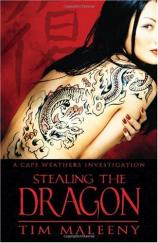Interview: March 9, 2007
Tim Maleeny's debut novel, STEALING THE DRAGON, is the first installment in an ongoing series featuring private detective Cape Weathers and his ex-assassin sidekick, Sally. In this interview with Bookreporter.com's Joe Hartlaub, Maleeny explains the appeal of San Francisco as his novel's setting and describes the various elements upon which he relied to bring its neighborhoods to life. He also elaborates on the complex and unique relationship between his main characters, discusses his childhood literary influences, and compares and contrasts writing with his "day job" in advertising.
Bookreporter.com: STEALING THE DRAGON is set primarily in San Francisco 's Chinatown, but far from the thoroughfares and businesses that tourists might normally frequent. How did you become familiar with these areas? Did you already possess an intimate knowledge about Chinatown before you began writing STEALING THE DRAGON, or was extensive research required?
Tim Maleeny: I live within 10 blocks of Chinatown in San Francisco, so I already had a good sense of the area. That said, much of the story takes place in the back alleys and lesser known haunts that tourists rarely see. Initially I did a lot of research on the history of the neighborhood, then drove and walked the streets late at night. The rest was invention. That's one of the nice things about writing fiction --- you get to make things up.
BRC: The Triads, organized crime groups operating in Chinatown, play a major role in the events of STEALING THE DRAGON. There are those who say that the Triads are a myth, while others say that they exert a quiet but powerful influence in San Francisco, not only in Chinatown but also beyond. What is your opinion? Will you be exploring Weathers's, and Sally's, relationship with the Triads in future Cape Weathers novels?
TM: Some experts say the Triads are the largest organized crime syndicate in the world, even bigger than the mafia. There is no doubt the Triads are a real criminal force in Asia, but you don't hear much about them in the U.S. You might have read about Tong gangs that controlled Chinatown in both San Francisco and New York over the years, and occasionally something shows up in the newspaper, but connections to the Triads are rarely mentioned. STEALING THE DRAGON takes the history of those organizations and connects the dots.
Given Sally's history, the Triads will be a constant presence; but in the second book in the series, BEATING THE BABUSHKA, Cape and Sally run into some unsavory characters from the Russian mob.
BRC: You have indicated elsewhere that STEALING THE DRAGON is the first of a series of books concerning Cape Weathers, a private investigator of the old school in San Francisco. Do you plan to keep the series primarily in Chinatown, or, given the wealth of ethnic and lifestyle neighborhoods in San Francisco, will you be moving things around the city a bit in future books?
TM: Cape and Sally will definitely be moving around. Much of the second book, BEATING THE BABUSHKA, takes place along the waterfront near the Ferry Building. And a novel I'm working on right now takes readers into the Mission District. But since Sally lives in Chinatown, that neighborhood will always be part of the landscape.
BRC: A great many authors of popular fiction --- from Robert Louis Stevenson, to Dashiell Hammett, to Fritz Leiber, and now you --- have lived and written in San Francisco. What do you think it is about San Francisco that makes it conducive for writing?
TM: San Francisco is a place of great contrasts. The city itself is so beautiful, yet it has the same crime and corruption as any other major city. But as a tourist destination, it constantly presents its best side, often obscuring or denying the darker elements of the city, even in the press. If you think about the moral dilemmas you encounter in crime fiction, San Francisco is a great metaphor for that eternal struggle between the face we present to the world and our flawed and sometimes darker inner self.
BRC: Your background is in the advertising field. What made you decide to write a novel? What are the similarities and differences between putting together an ad campaign and writing a novel?
TM: Advertising can be a fun but frustrating business in which you have a lot of responsibility for generating ideas but very little control over how those ideas get brought to life. When I started writing fiction, I wanted to create a world that I could control without answering to a committee. (That turned out to be true for the writing process, but once my agent started shopping the book, I quickly realized that publishing has just as many committees as any other business.)
BRC: What is your writing schedule like? How did you balance your advertising agency duties with writing?
TM: I wrote my first novel in the middle of the night while my wife slept. She was pregnant and going to bed early, so while she was preparing to give birth to our daughter, I was giving birth to this novel. I wrote my second novel in the morning, leaving home before my wife and daughter woke up and going to a restaurant, where I ate breakfast and wrote for two hours before heading to my day job. If I had any control over my schedule, I'd probably write mainly in the morning --- but since I don't, I steal time whenever I can.
BRC: There are parts of STEALING THE DRAGON that remind me of Sax Rohmer, who created and wrote the fabulous Fu Manchu series, among others. What was your own inspiration, literary and otherwise, for STEALING THE DRAGON?
TM: Thanks to my parents I grew up surrounded by books, and my Dad had this amazing collection of pulp adventure novels from the '30s and '40s, everything from Edgar Rice Burroughs to Sax Rohmer, Tarzan, John Carter of Mars, Fu Manchu, Doc Savage, The Shadow. STEALING THE DRAGON is a modern thriller, but I also wanted to evoke the feeling of those pulp novels I'd read as a kid.
BRC: The relationship between Cape Weathers and Sally is extremely interesting --- not romantic, yet something more than a friendship. How did their relationship develop for you as you were writing STEALING THE DRAGON? Did you always picture them as they are ultimately presented in STEALING THE DRAGON, or did they evolve to their current state as you finished the novel? Do you contemplate changing their relationship in future Cape Weathers books?
TM: Cape and Sally do have a complicated relationship, but that's what makes it so interesting. Early on in the story you learn that Sally is not a romantic interest, which was a conscious decision on my part to avoid the cliché of the private investigator's girlfriend sidekick. Part of the tension in the story deals with the question of how intimately you can really know someone without being in a romantic relationship, and also how far you're willing to go in order to find that person once you've lost them.
BRC: Cape Weathers is quite an interesting character, quick with a wisecrack yet quietly sensitive beneath the surface. How much of Tim Maleeny is in Cape Weathers?
TM: I think of Cape as that voice inside my head, someone willing to say and do all those things I wish I could, but never would in real life. He's also a bit more tortured than I am, though no less neurotic.
BRC: You currently reside in San Francisco, but your biography indicates that you have previously lived in a number of different cities. Do you plan to keep Cape and Sally in San Francisco, or will you perhaps be taking them to other cities, at least temporarily, in future novels?
TM: All the novels pivot around San Francisco, but stories that take Cape and Sally to New York, Mexico and Cuba are already scheduled for publication or being written. And Sally will always travel back to Hong Kong, even if it's only in her flashbacks.
BRC: Do you have any thoughts or plans regarding other series, or even stand-alone books, set in San Francisco or elsewhere?
TM: I'm actually finishing a stand-alone right now with the working title of JUMP. You can read an excerpt on my website, which features one of my favorite opening lines for any chapter I've written to date. JUMP also takes place in San Francisco but has an entirely new cast of characters, including a retired cop, a B-movie director and part-time blackmailer, two entrepreneurial young women running an Internet porn site from their apartment to pay for law school, and a Mexican drug lord named Zorro. It should be a lot of fun, assuming I ever finish this draft.
BRC: Last of all, I have to ask, even if it will get me, and possibly you, in trouble: Where did you find the model for the cover of STEALING THE DRAGON?
TM: The cover image came from stock photography, which was combined with a very cool type treatment by a genius designer named Gavin Duffy who works at my publisher, Midnight Ink. So sadly, I have not met the model, which means I can't introduce you. And as you might have guessed, you're not the first guy to ask me that question, but for most guys it's the first question they ask.




